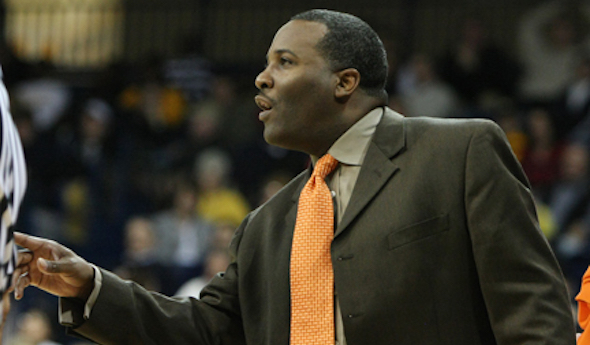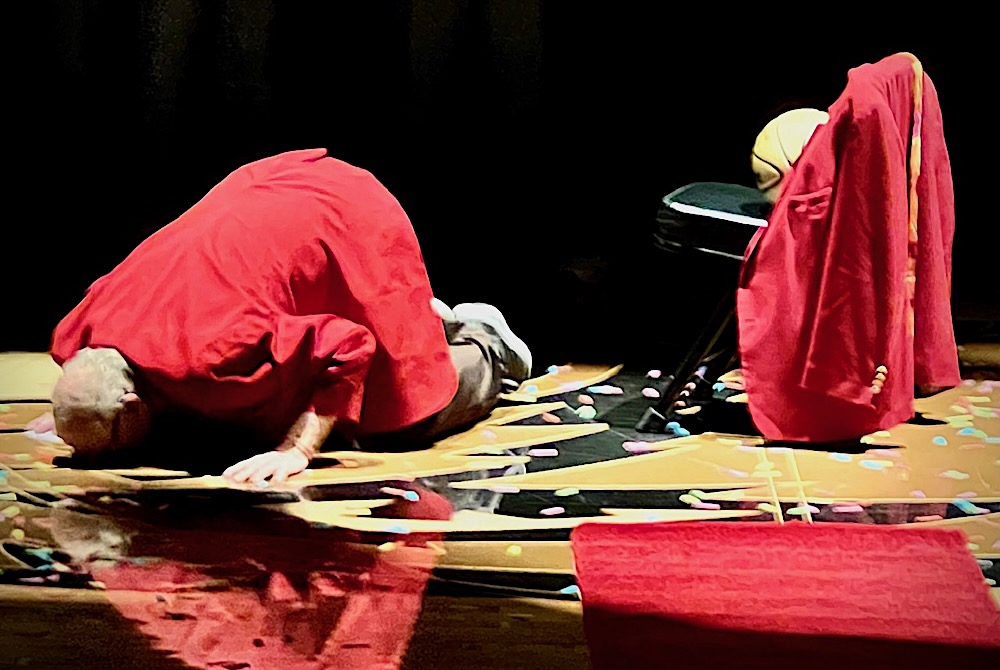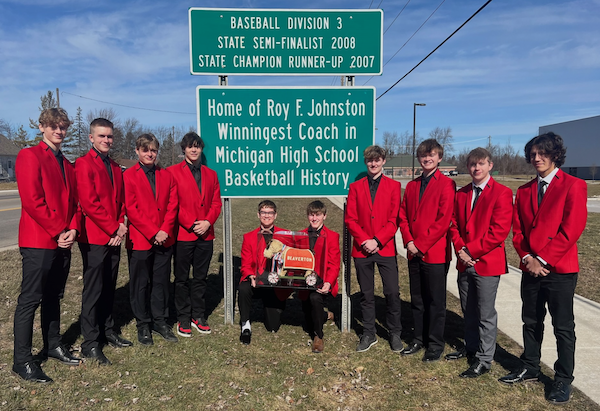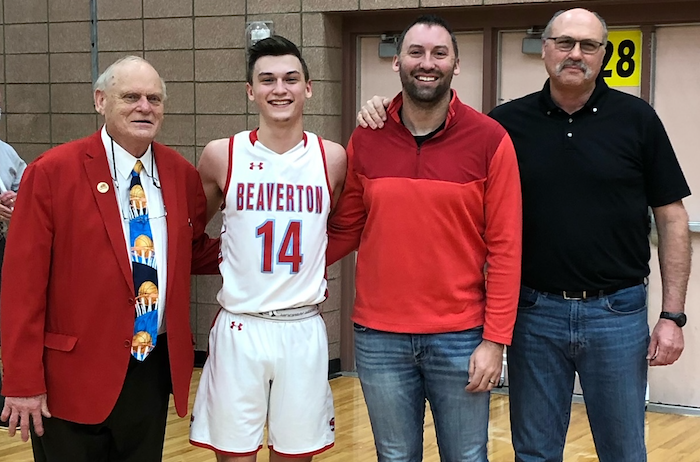
Coaches Return With College Knowledge
By
Tom Markowski
Special for Second Half
February 24, 2016
North Farmington boys basketball coach Todd Negoshian is not so vain to believe he’s at the top of his profession.
 After all, he’s nearing just his fifth season running what is considered one of the top programs in the Oakland Activities Association.
After all, he’s nearing just his fifth season running what is considered one of the top programs in the Oakland Activities Association.
What Negoshian is certain of is that he is a better coach now than he was during the early 2000s when he entered the profession as an assistant at North Farmington under his father, Tom Negoshian.
In addition to Todd Negoshian’s years as a high school coach, he spent three seasons (2004-07) as an assistant coach at Oakland University under coach Greg Kampe. Having worked at the college level has not only added to his knowledge as a coach but also given him an opportunity to work with different people under different circumstances but with similar goals.
“I learned a lot from Kampe,” Negoshian said. “I learned a lot about relationships. He has the uncanny ability to (scold) a kid and then 30 seconds later have your arms around him. It’s about building relationships.
“It’s his approach to coaching. There’s so many things you learned outside of coaching.”
This brief stint at the collegiate level gave Negoshian, 35, a whole new perspective on how to coach and how to be a coach. Building relationships takes time, and to those committed to being a coach who cares about his or her players, it’s paramount to allow for that time.
Some coaches, like John Beilein at University of Michigan, start out coaching at the high school level, move on to college and remain there. A number of others statewide have taken paths similar to that of Negoshian.
LaMonta Stone at River Rouge and Steve Hall at Detroit Cass Tech started coaching at the high school level and have recently returned to their roots after each spent several years as a college coach.
Stone played for the legendary Lofton Greene at River Rouge and then coached the Panthers to a Class B title in 1999. Stone ambitiously sought a position at the next level and was quite successful. He spent two seasons at Eastern Michigan, two at Ohio State and 10 at Bowling Green before returning to River Rouge last season as head coach.
And he has no regrets.
“At that point, I had goals,” Stone said of making the jump to college. “There were things I wanted to do. I still have goals. People ask me, would I go back to college? I don’t know. If the situation was right, I might.”
Stone, 49, returned for two reasons: family and community. Last season he was able to coach his oldest son, LaMonta, Jr., his senior year. Stone also has two other sons, ages 6 and 9.
 Basketball is king in River Rouge. Greene won a record 12 MHSAA titles and the program has won two more since his departure. But the Panthers relinquished their claim as a state power soon after Stone left and haven’t been much of a factor in the tournament since. Stone intends on changing that.
Basketball is king in River Rouge. Greene won a record 12 MHSAA titles and the program has won two more since his departure. But the Panthers relinquished their claim as a state power soon after Stone left and haven’t been much of a factor in the tournament since. Stone intends on changing that.
“It’s a situation where, I’d been (coaching in college) for 14 years,” he said. “I’d reached all my goals. The only one I didn’t was to become a head coach. But you’re an assistant in the Big Ten. You can’t get much higher than that.
“The opportunity to come back to that community, I just couldn’t pass up. I get to be more of a part of my sons’ lives.”
In addition to the high school season, Stone said he enjoys coaching during the summer, in camps and individually.
“I can, within the (Michigan High School Athletic Association) rules, work with kids outside of Rouge,” he said. “I get calls all the time saying can you work with my son. I work with them but they can’t come to Rouge. I like it that way. There’s no pressure on me or them.”
Hall, 45, was one of the state’s top players when he graduated from Cass Tech in 1988. He played four years in college (Washington, Virginia Tech) before playing professionally overseas. In 1996 he became the head coach at Detroit Rogers, an all-boys school in the Detroit Public School League. Hall spent nine seasons there and won three MHSAA titles before the school closed.
Hall went to Detroit Northwestern in 2005 and spent three seasons there, winning one PSL title, before accepting a position as an assistant coach at Duquesne University in Pittsburgh. He spent four seasons there before becoming an assistant coach at Youngstown State. On Aug. 25, Hall officially came back to Detroit as athletic director and boys basketball coach at Cass Tech.
Like Stone, Hall was looking for a more stable lifestyle. Family came first, and the opportunity to coach his alma mater was too good to pass up.
“A lot had to do with my life at this stage,” he said. “I have two young boys (ages 7 and 4) and to be more a part of their lives is important. If I wanted to spend time with them, we’d go to a game where I was recruiting a kid and that would be our time together on that given day.
“And I have a passion for this school. This whole year has been learning on the fly. At Rogers there was a lack of numbers. Here football is huge. We didn’t have a football team at Rogers. And here I have a surplus of numbers. It’s a different dynamic. Rogers was the smallest school in the PSL by enrollment. Cass is the biggest.”
Hall said he doesn’t miss the hours of travelling on the road, going into countless gymnasiums recruiting players and trying to convince them and their coaches that his university was the right one. It’s not that his responsibilities as athletic director and coach are less demanding. But being able to go home every night and see his children and sleep in his bed has its rewards.
Hall said he had more than a few conversations with Stone on returning home.
All three coaches agree that experience has its benefits. It’s not that coaching is any easier at this time. The challenges are still there and in many ways demand different approaches.
“Every stop makes you better,” Negoshian said. “Anytime you coach kids, the more you are around them, it helps.
“The game has changed. Society changed. Kids don’t want to fight through tough times. That’s why you see so many transfers. Everybody wants to be the hero. They want the focus on them. And it’s just not them. It’s the family. I’m not sure all of the parents are committed. They don’t want to go to A, B and C to get to D.”
Hall said the expectations for incoming freshmen and their parents are so different than it was when he was in high school. Then students went to a certain school, whether it was a power like Detroit Southwestern or a neighborhood school like Detroit Mumford, to be a part of an established program.
“It’s a trickle down from college,” Hall said. “It’s not, ‘I want to send my kid to a great program.’ There’s the attitude that if my son isn’t a part of it as a freshman, I’ll go somewhere else instead of being part of the process.”
 Tom Markowski is a columnist and directs website coverage for the State Champs! Sports Network. He previously covered primarily high school sports for the The Detroit News from 1984-2014, focusing on the Detroit area and contributing to statewide coverage of football and basketball. Contact him at [email protected] with story ideas for Oakland, Macomb and Wayne counties.
Tom Markowski is a columnist and directs website coverage for the State Champs! Sports Network. He previously covered primarily high school sports for the The Detroit News from 1984-2014, focusing on the Detroit area and contributing to statewide coverage of football and basketball. Contact him at [email protected] with story ideas for Oakland, Macomb and Wayne counties.
PHOTOS: (Top) Current River Rouge boys basketball coach LaMonta Stone returned to his alma mater after serving as a college assistant including at Bowling Green. (Middle) Todd Negoshian, LaMonta Stone, Steve Hall. (Top photo courtesy of LaMonta Stone.)

Johnston Retires as Winningest Coach, Much More to Beaverton Dream He Built
By
Paul Costanzo
Special for MHSAA.com
March 15, 2024
Before Roy Johnston left the court that bears his name for the final time as Beaverton head boys basketball coach on Feb. 23, 1,500-plus fans, family and current and former players had one more chant.
 It wasn’t the name of the coach they all adored after he wrapped up the winningest career in MHSAA basketball history. It wasn’t even the school song, or a slogan.
It wasn’t the name of the coach they all adored after he wrapped up the winningest career in MHSAA basketball history. It wasn’t even the school song, or a slogan.
With Johnston pumping a raised fist, the community chanted “Judy” to honor his wife, who could not be at the game or celebration as she was battling cancer.
It was a fitting tribute to the woman behind the coach who became more than the face of the community, and one last opportunity for those fans to say thank you to her for her own efforts and sacrifices in helping the Beaverton become something pulled straight from the movie screen – the small-town sports tale complete with the iconic coach in the lead role and generations of locals living their dedication by filling the stands for every game.
Judy Johnston passed away this past Saturday, a little more than two weeks after the ceremony that honored her husband. She was 81.
All interviews for this story were completed prior to her passing, but a common theme when talking about Johnston’s 50-year career and importance to Beaverton was that the entire family, specifically Judy, had played a big role.
“His family has put forth an incredible amount of effort into our community,” said former player Brent Mishler. “In basketball and in general.”
Family is at the center of Johnston and Beaverton’s immense success over his 50 years. Not only has he coached multiple generations of several Beaverton families – including three generations of Mishlers – but he’s coached his own children, and grandchildren.
Small town programs often rely on players who have grown up around them and together, and Beaverton has that in spades.
“It was a dream,” former player and Johnston’s co-coach, Shad Woodruff, said of having his son Layk play for Johnston. “I got to play for Roy and be part of all that Beaverton basketball is – it’s not just a sport around here. We have video of (Layk) dribbling a basketball in the gym literally before he could walk. He’s been the little guy that always looked up to (Roy’s grandsons) Spencer Johnston and Carter Johnston, so just to be a part of Beaverton basketball is special.
 “It’s like when your kid gets there, you’re giving your kid to the community for a while and saying, ‘Here you go.’ It’s amazing to watch your son out there, especially in a community like ours. Roy has created this thing with Beaverton basketball where every Friday night, it’s like church. Everybody’s there.”
“It’s like when your kid gets there, you’re giving your kid to the community for a while and saying, ‘Here you go.’ It’s amazing to watch your son out there, especially in a community like ours. Roy has created this thing with Beaverton basketball where every Friday night, it’s like church. Everybody’s there.”
The numbers behind Johnston’s career, which started in 1966 in Yale, are remarkable. He holds the MHSAA record for wins by a boys basketball coach at 833, the vast majority coming at Beaverton, the program he took over in 1974.
The Beavers won 21 conference titles, 17 District titles and five Regional titles during Johnston’s 50 years, adding a run to the MHSAA Semifinals in 1984.
Just six of Johnston’s seasons ended in records below .500, and in a fitting tribute to their coach, this year’s Beavers scratched and clawed their way to a five-game win streak at the end of the season to ensure his last wouldn’t be No. 7, finishing the year 12-12 with a loss to Beal City in the District Final.
Included in that streak was a 54-45 victory over rival Gladwin on the night Johnston was honored. The Beavers trailed by as many as nine during the second half before rallying to win, led by a 26-rebound performance from 6-foot, 1½-inch senior Reese Longstreth, who Woodruff called the epitome of a Beaverton basketball player.
“I’ve been fortunate to be around Roy for 40 years, and I’ve seen a lot of great wins, especially in that gym,” Woodruff said. “I can’t put anything above that one.”
Layk Woodruff made the final basket in the game, which will forever be the final basket made in Roy F. Johnston Gymnasium during the Johnston era.
“It was super emotional, I’d say, for a bunch of reasons,” Layk Woodruff said of the game. “We felt like it was our responsibility, we had to that game for Roy. It was a rivalry game, last home game of the year – there were a lot of emotions when that game ended. I didn’t even think about (hitting the final shot) until a couple days later. Now that I get to think about it, it’s pretty cool to say that was me. I’ll always remember that.”
One celebration led to another, as Johnston’s retirement ceremony followed the game. A tribute video created by Beaverton graduate Jason Brown, who owns a digital media company, and narrated by longtime Beaverton public address announcer Scott Govitz was played. Govitz admitted to getting choked up at times while recording the video.
“There were a couple times where I did more than one take,” he said.
Govitz was at the center of a massive effort to create the ceremony, with support from athletic director Will Gaudard, school staff and members of the community, including multiple businesses and organizations. Govitz had arranged for special lighting and video screens for the presentation. Special tickets were printed for the night – which also happened to be Beaverton’s Hall of Fame night. Following the video, a spotlight was shone on center court, where a single chair sat, one of Johnston’s vintage red blazers draped over its back.
The more than 100 former players who had come to celebrate their coach each had a glow stick they cracked on, and walked through the darkness to surround the chair.
Then Johnston walked the red carpet – much like his starters have for years when being introduced prior to games – and addressed the crowd.
He didn’t speak for long, but as Johnston so often does, he hit all the right notes, mixing gratitude with humor.
“Gladwin County is a great place to raise a good family,” Johnston said after thanking the traveling contingent from Gladwin.
“I want to thank everyone for a great run. Fifty years. A great run.”
For outsiders, it was a chance to see the softer side of Johnston rather than the man intensely patrolling the sidelines during games. It was a glimpse at the man that handed out suckers before games to every kid in attendance.
 “He belonged on an episode of ‘Grumpy Old Men,’ and he still could play the role,” Govitz said with a laugh. “He would always say, ‘Don’t listen to the way I say it, listen to what I say.’ He just wants you to do things correctly. His players, maybe they didn’t adore it at the time, but they adore it now. Being a part of that program taught them more than basketball skills. … What will happen, once they leave, they find that great respect for it. And, he does things quietly that no one ever knows or sees – helping someone in need, especially the ones in college, checking up on them or sending them some money. That helps build a program and build relationships. He said in his last speech that it’s about getting along with others. If you can’t get along well with others, you can’t get along. That’s what it’s about.”
“He belonged on an episode of ‘Grumpy Old Men,’ and he still could play the role,” Govitz said with a laugh. “He would always say, ‘Don’t listen to the way I say it, listen to what I say.’ He just wants you to do things correctly. His players, maybe they didn’t adore it at the time, but they adore it now. Being a part of that program taught them more than basketball skills. … What will happen, once they leave, they find that great respect for it. And, he does things quietly that no one ever knows or sees – helping someone in need, especially the ones in college, checking up on them or sending them some money. That helps build a program and build relationships. He said in his last speech that it’s about getting along with others. If you can’t get along well with others, you can’t get along. That’s what it’s about.”
Mishler echoed that sentiment, and some of the memories that stick out most to the 2002 graduate were when Johnston got after him in his own special way.
“Playing for him was a privilege,” said Mishler, whose father Steve played for Johnston in the ’70s, and his son Cameron played through 2021. “The life lessons he taught set you up for success in life for the future. ‘You need to hear what I’m saying, not the method I’m saying it.’ That’s so true. Being honest and having expectations, and expecting people to hit those expectations, is not a bad thing.”
After Johnston was done speaking, he knelt down and kissed the floor to say goodbye to the job he’s done for most of his life, and in a way, thank you, to the community he helped create and that he’ll now need more than ever.
“Roy’s good at making you feel like he’s not big on that stuff (being recognized), and he isn’t, but he definitely does appreciate it,” Shad Woodruff said. “He understands how important he is to the community, and that he’s done something really special. He understands what he’s done is a pretty big feat, but he doesn’t talk about it. He doesn’t brag about it.”
 Paul Costanzo served as a sportswriter at The Port Huron Times Herald from 2006-15, including three years as lead sportswriter, and prior to that as sports editor at the Hillsdale Daily News from 2005-06. He can be reached at [email protected] with story ideas for Genesee, Lapeer, St. Clair, Sanilac, Huron, Tuscola, Saginaw, Bay, Arenac, Midland and Gladwin counties.
Paul Costanzo served as a sportswriter at The Port Huron Times Herald from 2006-15, including three years as lead sportswriter, and prior to that as sports editor at the Hillsdale Daily News from 2005-06. He can be reached at [email protected] with story ideas for Genesee, Lapeer, St. Clair, Sanilac, Huron, Tuscola, Saginaw, Bay, Arenac, Midland and Gladwin counties.
PHOTOS (Top) Beaverton boys basketball coach Roy Johnston kisses the court that bears his name during a celebration of his retirement Feb. 23. (Middle) This season’s team stands at the entrance to town with signs announcing the program and coach’s successes. (Below) Johnston takes a photo with three generations of Mishlers – Cameron, Brent and Steve. (Top photo by Stephanie Johnston.)

